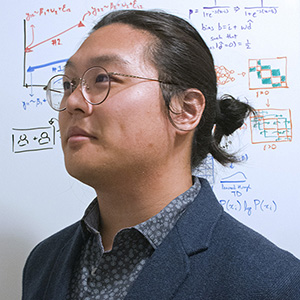
Son welcomed this opportunity to plan and instruct a session of the course “because he loves to teach and wanted to offer his own perspective. He delivered an effortless lecture jam packed with interesting psychological stories and facts, so updated that it included data that was only published weeks before,” says Oriel FeldmanHall, Manning Assistant Professor of Cognitive, Linguistic and Psychological Sciences.
As a TA Son helped students design and analyze their own studies, and provided students with feedback for scientific reports. “Students often felt frustration as they struggled with new skills, but there was always a moment when everything finally "clicked" for the first time,” he says.
Senior Lecturer Elena Festa also shares that Son would often make insightful suggestions while he was a TA for foundation course, CLPS0010. She explains how he found a short TikTok video on ‘how bees tell time’ and integrated it into a presentation illustrating how to develop a scientific research question.
“He is an outstanding teacher and a deep thinker who is particularly concerned with pedagogical approaches that foster independent and critical thinking in our students,” says Festa.
Son has a unique take on being selected for this award, “it tells me that I've been a frequent failure, and this is something that I'm glad for. Failure tells us that if we want to accomplish our goals, we need to try something different, to think differently, to grow and adapt, to let curiosity and creativity guide how we explore our world – and that’s at the heart of both teaching and being a lifelong learner.”
Beyond his TA work, Son is doing dissertation research on how the brain represents the structure of social networks, and how people use these representations to make consequential social decisions. Son explains, one of the foundational ideas in cognitive science is that we construct "cognitive maps" that help individuals organize information into structured mental representations. In his words: “How many windows were there in your childhood home? If you're anything like me, you closed your eyes and took a mental "walk" around the house in order to answer this question. My research investigates whether we might build similar maps of our social networks.”